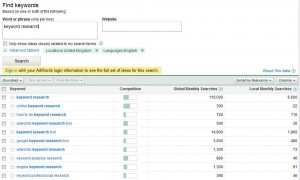When it comes to SEO tactics it’s usually a case of simple is best. Partly because simple is – by definition – easy to implement. Partly because – despite appearances to the contrary – the search engines are prefer things to be fairly simple because they can grade them better. And partly because you’re a lot more likely to do a few simple things rather than some complicated ones, so your SEO tactics will get done which in turn will get you results and encourage you to do more.
1. Titles are everything
Page titles are far and away the most important SEO tactic that you can use.
You won’t really see them when you’re looking at your site in your browser unless you glance up to the blue bar right at the top of it. But that’s not where their importance lies.
Page titles are important because they count even before people visit your site.
They’re the blue underlined links that you see when you search for something.
And if they look poor, people won’t click on them. They’ll choose a different result instead. Which is bad in the short term because they won’t visit your site. It’s even worse in the medium to long term because Google measures and records how many times people click on each search result. If your site is unpopular, it will get pushed further down the search results.
2. Page descriptions are next
You won’t see the page description in your web browser unless you’re like me and nerdy enough to select the “view source” option. And even I don’t do that very often!
But they appear in the search results unless your web designer hasn’t remembered to include them or unless Google thinks that your description is so poor that its computers can do a better job.
Most people searching don’t read the page description in full unless they think that they can get an answer to their search without making the effort of clicking an extra mouse button.
But that doesn’t lessen their importance.
Google bolds all the words that you’ve searched for in their search results. Wherever they appear – in the page title, in the page description and even in the URL that’s displayed.
So one of your SEO tactics needs to be making sure that your page descriptions really are descriptive and that they include enough of your keywords (without being silly about it) to allow your page to stand out in the search results.
3. How long do people stay on your site?
This is kind of the elephant in the room.
As well as measuring how many people click onto your site and tracking that depending on how far up you are in the search results, Google also track how long people stay on your site.
They then compare that time with other comparable sites.
If, on average, people stay on your site longer than they stay when they click through to one of your competitors, you’ll get what are effectively bonus points on your SEO score for that.
If, on average, people leave your site faster than they do your competitors then you’re likely to be deemed less useful.
Of course, that varies by search. So – being overly simplistic – if someone was looking for the answer to 2 + 2 then you’d almost certainly score higher if they clicked their back button fast. But most of the time people are looking for answers to more complicated questions which means that the longer they hang around your site the better.
In turn, this means that you need good content on your site to keep people looking around it and then hopefully contacting you to use your services.





